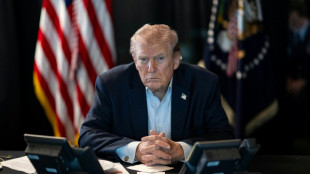-
 Global markets turmoil intensifies on Iran war
Global markets turmoil intensifies on Iran war
-
Iran targets Mideast energy industry and US missions

-
 Rahm accuses DP World Tour of 'extorting players' with LIV deal
Rahm accuses DP World Tour of 'extorting players' with LIV deal
-
Thousands of Afghans displaced by Pakistan conflict

-
 China, North Korea make winning starts at Women's Asian Cup
China, North Korea make winning starts at Women's Asian Cup
-
EU asylum applications down but Iran concerns mount

-
 Rahm accuses DP World Tour of 'exorting players' with LIV deal
Rahm accuses DP World Tour of 'exorting players' with LIV deal
-
Drones hit US embassy as vengeful Iran targets Mideast cities

-
 Mideast war exposes fragile oil, gas dependency
Mideast war exposes fragile oil, gas dependency
-
How the T20 World Cup semi-finalists shape up

-
 Oil extends gains and stocks dive as Middle East war spreads
Oil extends gains and stocks dive as Middle East war spreads
-
Warming El Nino may return later this year: UN

-
 Trump says US-UK relationship 'not like it used to be'
Trump says US-UK relationship 'not like it used to be'
-
Eight years on, trial begins in Argentina submarine implosion

-
 Beijing votes out three generals from political advisory body
Beijing votes out three generals from political advisory body
-
Oil extends gains and stocks dive as Iran conflict spreads

-
 The French village where Ayatollah Khomeini fomented Iran's revolution
The French village where Ayatollah Khomeini fomented Iran's revolution
-
South Africa, India eye T20 World Cup rematch as semi-finals begin

-
 Trump hosts Germany's Merz for talks eclipsed by Mideast war
Trump hosts Germany's Merz for talks eclipsed by Mideast war
-
Second-hand phones surf rising green consumer wave

-
 Pakistanis at remote border describe scramble to leave Iran
Pakistanis at remote border describe scramble to leave Iran
-
China votes to oust three generals from political advisory body

-
 Murray scores 45 as Nuggets hold off Jazz
Murray scores 45 as Nuggets hold off Jazz
-
Five things about the 2026 F1 season

-
 Scrum-half Gibson-Park: Ireland's 'petit general'
Scrum-half Gibson-Park: Ireland's 'petit general'
-
Geopolitical storm leaves isolated Greenlanders hanging by a telecoms thread

-
 Myong hat-trick as North Korea cruise at Women's Asian Cup
Myong hat-trick as North Korea cruise at Women's Asian Cup
-
AI disinformation turns Nepal polls into 'digital battleground'

-
 New Israel, Iran attacks across region: Latest developments in Middle East war
New Israel, Iran attacks across region: Latest developments in Middle East war
-
China's overstretched healthcare looks to AI boom

-
 Oil extends gains and stocks drop as Iran conflict spreads
Oil extends gains and stocks drop as Iran conflict spreads
-
Rituals of resilience: how Afghan women stay sane in their 'cage'

-
 Strait of Hormuz impasse squeezes world shipping
Strait of Hormuz impasse squeezes world shipping
-
Fresh Israel, Iran attacks across region: Latest developments in Middle East war

-
 Oscar-nominated Iranian doc offers different vision of leadership
Oscar-nominated Iranian doc offers different vision of leadership
-
Oscar-nominated docs take on hot-button US social issues

-
 'I couldn't breathe': The dark side of Bolivia's silver boom
'I couldn't breathe': The dark side of Bolivia's silver boom
-
Trump warns of longer Iran war as Riyadh, Beirut hit

-
 Underground party scene: Israelis celebrate Purim in air raid shelters
Underground party scene: Israelis celebrate Purim in air raid shelters
-
Flowers, music, and soldiers at funeral of drug lord

-
 'Safety and wellbeing' will guide F1 Mideast planning: FIA chief
'Safety and wellbeing' will guide F1 Mideast planning: FIA chief
-
Trump to attend White House Correspondents' dinner

-
 Will Iran's missiles drain US interceptor stocks?
Will Iran's missiles drain US interceptor stocks?
-
Trump warns of longer Iran war as violence spreads

-
 Energy infrastructure emerges as war target, lifting prices
Energy infrastructure emerges as war target, lifting prices
-
Trump warns of longer Iran war, Rubio points at Israel

-
 US urges to 'depart now' from Middle East: Latest developments in Iran war
US urges to 'depart now' from Middle East: Latest developments in Iran war
-
Ecuador launches joint anti-drug operations with US

-
 Getafe deal flat Real Madrid La Liga title race blow
Getafe deal flat Real Madrid La Liga title race blow
-
Rubio, Hezbollah and Qatar: Latest developments in Iran war

China, Trump, and the power of war?
As tensions in the Taiwan Strait continue to simmer, foreign policy experts are exploring a hypothetical scenario: If China were to launch a military attack on Taiwan, would a newly re-elected President Donald Trump intervene with the full might of the U.S. armed forces to defend the island? This question underscores the complex interplay of regional alliances, global power dynamics, and the unpredictability of American politics.
Setting the Stage: China’s Military Ambitions
Historical Context:
China regards Taiwan as a breakaway province destined for reunification—by force if necessary.
Modern Capabilities:
The People’s Liberation Army (PLA) has accelerated its modernization program, including advancements in naval power, ballistic missiles, and air force technology.
Regional Impact:
An attack on Taiwan could destabilize not only East Asia but also the global economy, given Taiwan’s crucial role in semiconductor manufacturing and maritime trade routes.
The Trump Factor: A New Administration’s Possible Response
Campaign Promises and Rhetoric:
Donald Trump has a record of strong nationalist rhetoric, emphasizing American military strength. If re-elected, he might lean into campaign pledges to protect U.S. interests abroad, including key allies and partners.
Previous Policies on China:
In his earlier administration, Trump took a hardline stance against Beijing on trade, technology, and security. This history suggests he could respond forcefully if China initiates open conflict.
Alliance with Taiwan:
Although the U.S. does not maintain formal diplomatic ties with Taipei, it is bound by the Taiwan Relations Act to provide defensive support. A President Trump might interpret this as a mandate to escalate, including mobilizing U.S. forces.
Potential Military Scenarios
Naval Blockade:
The U.S. Navy could intervene by establishing a defensive perimeter around Taiwan, deterring Chinese amphibious assaults. Warship deployments to the region would send a clear signal of U.S. resolve, but also increase the risk of direct engagement.
Air Superiority Campaign:
If China’s air force attempted to dominate the skies over Taiwan, the U.S. Air Force and Navy’s carrier air wings could provide critical support to Taiwan’s defense. This scenario would significantly escalate hostilities, potentially leading to sustained aerial combat.
Economic and Cyber Warfare:
Rather than committing large numbers of troops, Trump could opt for widespread sanctions on China, coupled with cyber operations to disrupt PLA communication and logistics. This approach would be aggressive yet potentially less risky than a full-scale military confrontation.
Risks and Global Ramifications
Escalation to Major Conflict:
Direct clashes between the U.S. and China could spiral rapidly, raising concerns about nuclear brinkmanship.
Economic Fallout:
Heightened tensions may lead to severe disruptions in global supply chains, especially regarding technology and semiconductor industries.
International Alliances:
A U.S. military response would likely draw in regional allies such as Japan, South Korea, and Australia, with NATO partners possibly offering political or limited logistical support.
Diplomatic Alternatives
Negotiated Settlements: Even in a crisis, there might be space for last-minute talks hosted by neutral countries or facilitated by international bodies like the United Nations. Multinational Coalitions: The U.S. might seek to build coalitions with allies in Europe and Asia to present a united front, pressuring Beijing to halt aggression.
Conclusion: An Uncertain Future
Should China take the drastic step of attacking Taiwan, the question of American intervention under a potential new Trump administration looms large. Historical precedent—along with Trump’s combative stance on foreign policy—suggests a robust response could follow. Yet the costs, both human and economic, would be staggering for all sides involved.
In this hypothetical scenario, much depends on Beijing’s calculations of risk versus reward, as well as Trump’s willingness to gamble on a major conflict to assert U.S. influence and uphold a promise to protect American allies. Ultimately, the future of Taiwan’s sovereignty could hinge on whether deterrence succeeds—or if the world’s two largest economies find themselves at the brink of war.

EU: Tariffs on all Chinese electric Cars

Zelenskyy: ‘What worked in Israel work also in Ukraine’

Electric car crisis: Future of a Audi plant?

Vladimir Putin, War criminal and Dictator of Russia

EU vs. Hungary: Lawsuit over ‘national sovereignty’ law

Ukraine: Zelenskyy appeals for international aid

Lebanon: Is a new wave of refugees coming to the EU?

Terrorist state Iran attacks Israel with missiles

Terrorist state Iran attacks Israel with missiles

Belarus: ICC investigates dictator Lukashenko

NATO: Ukraine ‘at the top of the list!’




